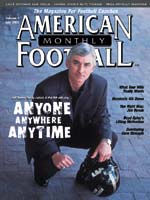AMERICAN FOOTBALL MONTHLY THE #1 RESOURCE FOR FOOTBALL COACHES
Article CategoriesAFM Magazine
|
Anyone, Anywhere, AnytimeA look inside a college football\'s most underrated football programsby: Aaron S. Lee © More from this issue Anyone. Anywhere. Anytime. ... This is not just a slogan for the University of Southern Mississippi, located in the piney woods of Hattiesburg, Miss., it is a way of life that has defined the character and grit of Southern Miss football for all of its 86-year existence. Schools like Southern Miss have embodied the pure essence of competition that envelops college football and all those that stand outside the BCS. Schools that constantly fight against the powers that control the destinies of all Division I football, schools like Colorado State and Fresno State. Schools that stand where the Florida States and Virginia Techs have stood years earlier before posit....The full article can only be seen by subscribers. Subscribe today!
|
|
|||||||
| HOME |
MAGAZINE |
SUBSCRIBE | ONLINE COLUMNISTS | COACHING VIDEOS |
Copyright 2025, AmericanFootballMonthly.com
All Rights Reserved





